“Words are more treacherous and powerful than we think.”

- June 21, 1905 – April 15, 1980
- Born in France
- Philosopher, novelist, playwright
table of contents
Quote
“Words are more treacherous and powerful than we think.”
Explanation
In this quote, Sartre highlights the dangerous power that language holds in shaping human experience and relationships. Words, while seemingly simple tools for communication, have the potential to manipulate, control, or influence in ways that are often subtle or unnoticed. Sartre refers to words as being “treacherous,” suggesting that they can deceive, mislead, or betray people, whether intentionally or unintentionally. Words can be used to create false realities, distort the truth, or reinforce harmful narratives. In this way, language can be a tool of manipulation or oppression, as it shapes how people think, feel, and act.
At the same time, words are powerful because they are the primary means through which we express ideas, share experiences, and create meaning. They are the building blocks of our social reality, shaping not just personal communication, but also politics, culture, and society at large. Sartre’s point suggests that we should be cautious about the power words have in shaping not only our perception of the world, but also our beliefs and actions. Words can create or destroy, unite or divide, and in this sense, their impact often extends far beyond what we initially realize.
In modern contexts, this quote is particularly relevant in discussions around media, political discourse, and social influence. In a world where language is often used in advertising, propaganda, or social media, the power of words can shape public opinion and influence behavior on a massive scale. Words can incite social change, or they can be used to manipulate or mislead. Sartre’s reminder calls for greater awareness of how we use language and the ways in which words can shape the world in ways we may not always fully comprehend. It urges us to be mindful of the treachery that words can carry and the responsibility we have in choosing them carefully.
Would you like to share your impressions or related stories about this quote in the comments section?

